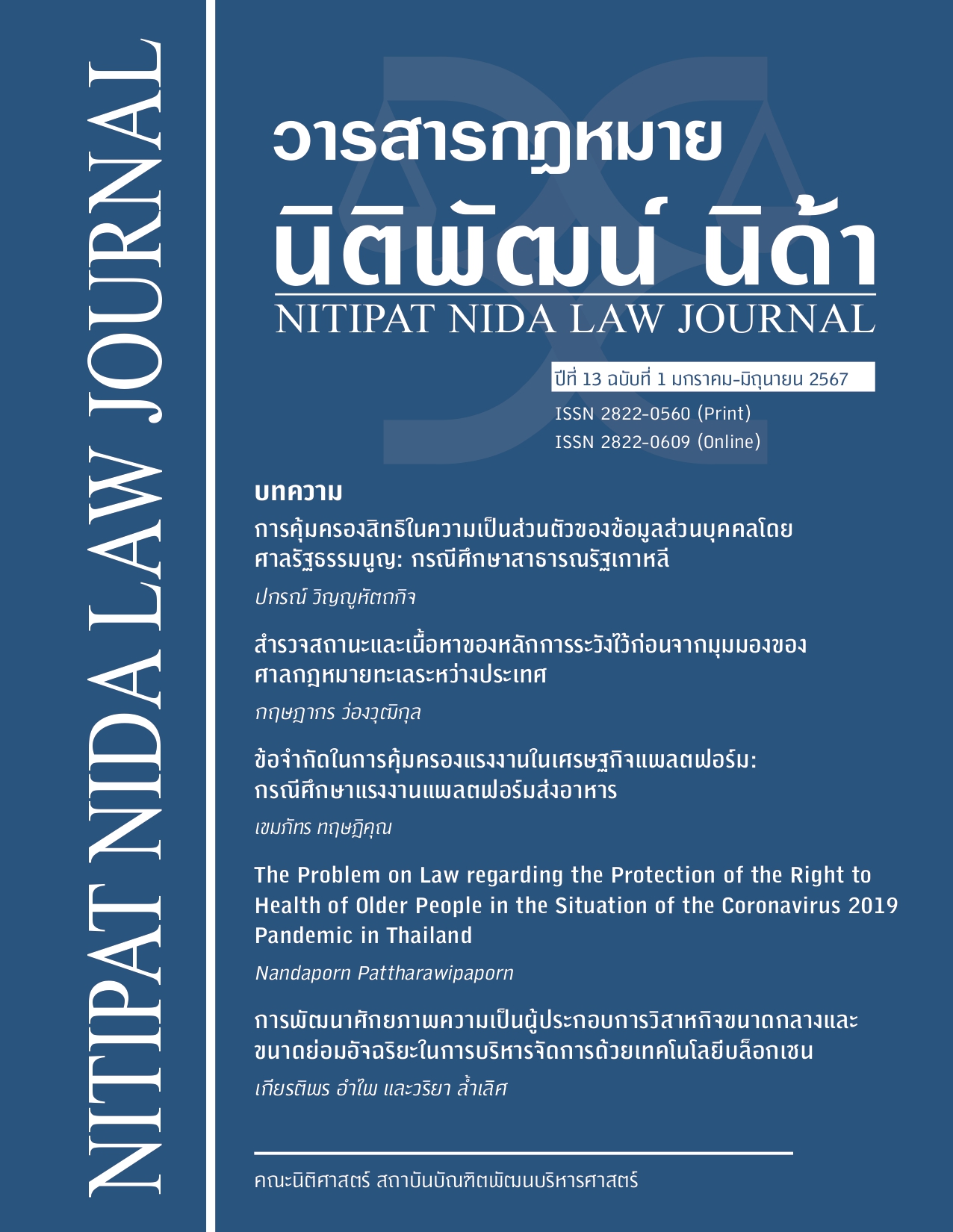Protection of the Right to Privacy of Personal Data by the Constitutional Court: A Case Study of the Republic of Korea
Keywords:
Right to Privacy, Personal Data, Constitutional Court, Republic of KoreaAbstract
With today’s cutting-edge technology, personal data can easily be used and exploited for various benefits without legal consent. Thus, many countries have enacted state-level statute to protect personal data. Moreover, some countries which consider the right to personal data as the right to privacy of citizens, they would also protect such rights in the Constitution. For example, both Thailand and the Republic of Korea (South Korea) have established legislation to protect personal data in both specific statute and the Constitution. However, until now, Thailand has never had any case related to the right to privacy of personal data adjudicated by the Constitutional Court. While the Constitutional Court of the Republic of Korea has established several legal principles in several cases related to such issue. Therefore, this research was conducted to study the protection of the right to privacy of personal data under the Constitution of the case study country i.e. Republic of Korea in order to obtain legal principles which the Constitutional Court of Thailand can apply in similar cases.
From the research study, it was found that there are two channels for exercising the right to file a case with the Constitutional Court i.e. (1) the Court of Justice requests the Constitutional Court to determine whether the existing law is in conflict with the provisions of the Constitution and (2) the individual files a complaint to request the Constitutional Court to determine whether the action of a government agency is in violation of the Constitution, or whether the existing law is in conflict with the Constitution. Additionally, the Constitutional Court of the Republic of Korea has established three legal principles to protect the right to privacy of personal data i.e. (1) Principle of proportionality (2) Principle of less restrictive alternative and (3) Principle of self-determination of personal information. These principles could potentially be considered as a guideline for the Constitutional Court of Thailand to determine cases related to the protection of the right to privacy of personal data for the benefit of Thailand.
References
Hyung-A Kim, ‘Yoon Suk-yeol’s rise from rebel prosecutor to president’ (Eastasiaforum, 23 April 2022) https://www.eastasiaforum.org/2022/04/23/yoon-seok-yeols-rise-from-rebel-prosecutor-to-president/ accessed 10 May 2022
Justine Guichard, ‘The Role of the Constitutional Court of Korea in the Transition from Authoritarian to Democratic Rule’ in Marie Kim (eds), The Spirit of Korean Law: Korean Legal History in Context (Brill’s Asian Law Serie, 2016)
M. Lutfi Chakim, ‘A Comparative Perspective on Constitutional Complaint: Discussing Models, Procedures, and Decision’ (2019) Constitutional Review Vol. 5 No. 1
Park Whon-il, ‘Constitutional Court Decision 2003Hun-Ma282-425’ (KoreanLII, 25 August 2016) <http://www.koreanlii.or.kr/w/index.php/2003Hun-Ma282> accessed 24 June 2021
--, ‘Constitutional Court Decision 2014Hun-Ma449’ (KoreanLII, 4 January 2021) <http://www.koreanlii.or.kr/w/index.php/2014Hun-Ma449> accessed 29 June 2021
--, ‘Constitutional Court Decision 99Hun-Ma513 และ 2004Hun-Ma190 (consolidated)’ (KoreanLII, 8 September 2016) <http://www.korea
nlii.or.kr/w/index.php/99Hun-Ma513> accessed 22 June 2021
--, ‘Supreme Court Decision 96Da42789’ (KoreanLII, 8 September 2016) <http://www.koreanlii.or.kr/w/index.php/96Da42789> accessed 20 June 2021

Downloads
Published
How to Cite
Issue
Section
License
Copyright (c) 2024 Nitipat NIDA Law Journal

This work is licensed under a Creative Commons Attribution-NonCommercial-NoDerivatives 4.0 International License.


